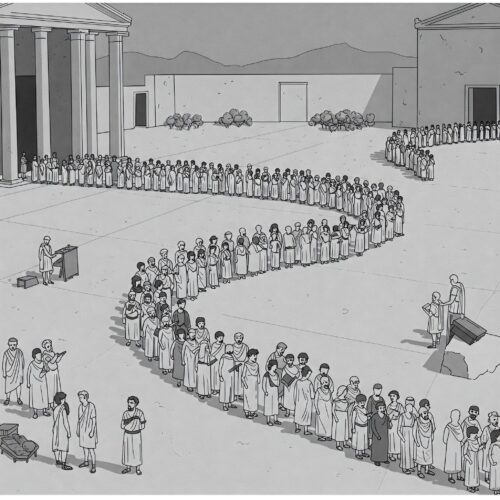Was Luke Wrong About the Census? New Evidence Says No
Was Luke wrong? In the Gospel of Luke, chapter 2, we read Jesus was born during a Roman census when Quirinius was governor of Syria. For centuries, sceptics have pointed to this passage as evidence of an error in the Bible. Why? Because Jewish historian Josephus, wrote Quirinius became governor of Syria around 6-7 AD and conducted a census then, while King Herod (who figures in the nativity story) died in 4 BC. This creates an apparent 10-year discrepancy between Luke’s account and established history.
But does this discrepancy prove Luke was wrong? Recent historical research and archaeological discoveries suggest otherwise. Let’s explore the evidence that suggests Luke may have been accurate after all.
WAS LUKE WRONG? THE HISTORICAL PROBLEM EXPLAINED
First, let’s understand the problem clearly. Luke 2:1-2 states: “In those days Caesar Augustus issued a decree that a census should be taken of the entire Roman world. This was the first census that took place while Quirinius was governor of Syria.”
Meanwhile, Matthew’s Gospel places Jesus’s birth during the reign of Herod the Great, who we know died in 4 BC. Josephus, writing his histories decades later, mentions Quirinius becoming governor of Syria in 6-7 AD and conducting a notorious census that sparked a Jewish revolt.
If both Gospel writers are correct about when Jesus was born, how could the census under Quirinius’ governorship align with Herod’s lifetime? This apparent contradiction has fuelled criticism of Luke’s historical reliability.
EVIDENCE FOR LUKE’S ACCURACY: MULTIPLE GOVERNORSHIPS THEORY
One compelling solution comes from evidence suggesting Quirinius actually held official positions in Syria twice during his career.
Archaeological discoveries, particularly the Lapis Tiburtinus inscription found near Tivoli, Italy, reference an unnamed Roman official who served as governor of Syria on two separate occasions. Many scholars have identified this official as Publius Sulpicius Quirinius based on the career details provided.
Roman historical records confirm this Quirinius was a distinguished military leader who served in various capacities throughout the empire. It’s entirely plausible he served in an official capacity in Syria during Herod’s reign (possibly as a military leader or special envoy with governing authority), then returned as the formal governor years later when Judea was incorporated as a Roman province.
TRANSLATION CONSIDERATIONS THAT SOLVE THE PROBLEM
Another solution lies in the precise translation of Luke’s Greek text. The phrase traditionally translated as “this was the first census that took place while Quirinius was governor of Syria” contains the Greek word, prote.
Scholars argue the sentence with this word can also be translated thus: “this census took place before Quirinius was governor of Syria.” This alternative reading has grammatical precedent in other Greek texts, including elsewhere in the New Testament. If correct, Luke would simply be distinguishing this earlier census from the well-known later one under Quirinius that his readers would have been familiar with.
ROMAN CENSUS PRACTICES EXPLAIN THE TIMING
Understanding Roman administrative practices also helps resolve the apparent discrepancy. Historical records show:
- Roman censuses were complex operations that often took years to complete
- Caesar Augustus initiated several empire-wide registrations during his reign
- There was an administrative distinction between registration (enrolment) and taxation assessment
- Provincial censuses typically followed a regular cycle
What Luke describes could have been the initial registration phase of a census that was completed years later under Quirinius’ formal governorship. Augustus’ reign was marked by increased systematisation of provincial administration, making an empire-wide registration programme entirely plausible during the period of Jesus’s birth.
ARCHAEOLOGICAL CORROBORATION
Archaeological evidence from Egypt shows Romans conducted regular censuses on 14-year cycles in that province. This established pattern of census-taking throughout the empire supports Luke’s reference to a widespread registration decree from Augustus.
Additionally, papyri and inscriptions discovered throughout the eastern Mediterranean confirm increased Roman administrative activity in the region during the final years of Herod’s reign, as Rome prepared to restructure the governance of these territories.
WAS LUKE WRONG? ADDRESSING THE COUNTER-ARGUMENTS
Critics often rely heavily on Josephus’ account, but it’s important to recognise Josephus had his own biases and limitations. He focused primarily on the later census because it sparked a significant revolt, not because it was the only census.
The silence of other historical sources regarding an earlier census doesn’t disprove Luke’s account. Many ancient administrative records have been lost, and historians regularly acknowledge the fragmentary nature of our evidence for this period.
Furthermore, Luke demonstrates remarkable historical accuracy in other verifiable details throughout his writings. He correctly names minor local officials, accurately describes geographical details, and shows familiarity with proper titles and protocols of the period. This established accuracy gives credibility to his census account.
CONCLUSION: WAS LUKE WRONG?
When we examine the full historical evidence—archaeological discoveries, Roman administrative practices, proper translation of the Greek text, and the possibility of Quirinius serving twice in Syria—we find Luke’s account of the census is entirely plausible.
Rather than demonstrating error, this apparent “discrepancy” actually highlights the need for careful historical investigation and an understanding of ancient administrative practices. As research continues, we consistently find archaeological and historical discoveries tend to validate rather than undermine the biblical narratives.
WAS LUKE WRONG? RELATED FAQs
Wasn’t Luke writing decades after the events? How could he be accurate about the census? Luke likely had access to imperial records and eyewitness testimonies when composing his Gospel around 60-80 AD. As a physician and companion of Paul who travelled throughout the Roman Empire, he would have had opportunities to consult official documents and interview witnesses. His careful approach is evident in his prologue where he states his intention to write an “orderly account” based on information from “eyewitnesses and servants of the word.”
- Has Luke been proven right about other historical details that were once disputed? Yes, Luke has been vindicated on numerous historical points that scholars once questioned. The existence of Lysanias as tetrarch of Abilene (Luke 3:1) was confirmed by inscriptions discovered near Damascus. His precise use of titles for local officials (like “politarchs” in Thessalonica) has been verified by archaeological discoveries, and his knowledge of local customs and geography has repeatedly been confirmed by archaeological findings.
- How does the Quirinius census controversy compare to other alleged Bible “errors”? The Quirinius census controversy exemplifies how apparent biblical “errors” often dissolve when new evidence emerges and deeper historical context is understood. Similar cases include the existence of the Hittites (once dismissed as biblical fiction until archaeological discoveries), the historical existence of Pontius Pilate (confirmed by the Pilate Stone), and various customs and practices described in the Bible that archaeological evidence has subsequently confirmed.
Why would Augustus order an empire-wide census as Luke describes? Augustus implemented sweeping administrative reforms to stabilize the empire after civil wars, including improved taxation and provincial governance systems. The Res Gestae Divi Augusti (Augustus’s own account of his accomplishments) mentions three empire-wide censuses conducted during his reign, confirming his interest in comprehensive population registration. Such registrations would help manage military recruitment, taxation planning, and resource allocation across the vast territories under Roman control.
- Why don’t Roman historians mention the specific census Luke describes? Roman historians typically focused on major political events, military campaigns, and affairs directly involving the imperial court. Administrative matters like provincial censuses were seldom worthy of detailed mention unless they triggered significant unrest (like the later Quirinius census that sparked revolt). The fragmentary nature of surviving Roman historical records means many routine administrative activities went unrecorded in surviving documents, despite being regular occurrences.
- How might Joseph and Mary’s journey to Bethlehem fit with Roman census practices? Roman censuses typically required registration in one’s place of origin or property ownership, consistent with Joseph returning to his ancestral home. While some scholars have questioned this practice, Egyptian census documents reveal people did travel for registration purposes, especially those who owned property in multiple locations. The requirement for Mary to accompany Joseph might reflect the particular implementation in Herod’s kingdom, where Jewish customs regarding family registration were likely accommodated.
Are there other examples where Luke’s historical precision has been confirmed by archaeology? Luke’s detailed account of Paul’s shipwreck on Malta (Acts 27) has been verified by maritime archaeologists as remarkably accurate in its description of ancient seafaring conditions. His knowledge of local political structures is demonstrated in his precise use of titles for officials in different cities (proconsuls, asiarchs, grammateus). Even his detailed geographical knowledge of places like Ephesus, Philippi, and Athens has been confirmed through archaeological excavations, revealing his commitment to historical accuracy.
WAS LUKE WRONG? OUR RELATED POSTS
- Historical Accuracy of the Book of Acts: A Treasure Trove of Evidence
- Why Do We Affirm the Bible’s Reliability? Five Compelling Reasons
- Divine Fingerprints on Ancient Parchment—The Dead Sea Scrolls
- Connecting the Dots: Coincidences Affirm Bible Reliability
- Archaeology Endorses Scripture: Papyri and Dead Sea Scrolls
- New Testament Reliability: Debunking Myths and Lies
- Archaeological Finds Validate Bible: Unearthing Biblical Truth
Editor's Pick

What Makes a Godly Mom? A Scripture-Backed Guide
In our culture’s confusion about gender roles and parenting, the timeless question remains: what makes a godly mother? While secular [...]

Paul’s Mandate for Men: Headship Or Servant Leadership? Or Both?
Modern Christianity has fallen into a trap. We've created an either/or battle between "headship" and "servant leadership," as if these [...]

Should We Stop Using Male Pronouns for God? Why Do We Say No?
A friend of ours arrived eagerly at his first theology class in seminary. But he quickly discovered something troubling: the [...]

Did Old Testament Law Force Women to Marry their Rapists?
**Editor’s Note: This post is part of our series, ‘Satan’s Lies: Common Deceptions in the Church Today’… Viral misinformation abounds [...]

From Danvers To Nashville: Two Statements, One Biblical Vision
30 years separate the Danvers Statement on Biblical Manhood and Womanhood (1987) and the Nashville Statement on Human Sexuality (2017). [...]

The Nashville Statement: Why Affirm It Despite Media Backlash?
WHY DO REFORMED CHRISTIANS STAND BY THIS STATEMENT ON MARRIAGE AND GENDER? When the Nashville Statement was released in 2017, [...]

Who Is Belial? Solving The 2 Corinthians 6:15 Mystery
Belial: This name from the pages of Scripture chills the soul. Who is this mysterious figure Paul invokes in 2 [...]

Celibacy Or Castration: What Jesus Really Means in Matthew 19:12
One of Scripture's most shocking misinterpretations led theologian Origen to castrate himself in the third century. His tragic mistake? Taking [...]

Philippians 4:13: Did Paul Really Mean We Can Do ALL Things?
"I can do all things through Christ who strengthens me." It's on gym walls, graduation cards, and motivational posters everywhere. [...]

The Ordinary Means of Grace: Why Are They Indispensable?
ORDINARY MEANS FOR EXTRAORDINARY TRANSFORMATION What if God's most powerful work in believers' lives happens through the most ordinary activities? [...]
SUPPORT US:
Feel the Holy Spirit's gentle nudge to partner with us?
Donate Online:
Account Name: TRUTHS TO DIE FOR FOUNDATION
Account Number: 10243565459
Bank IFSC: IDFB0043391
Bank Name: IDFC FIRST BANK






